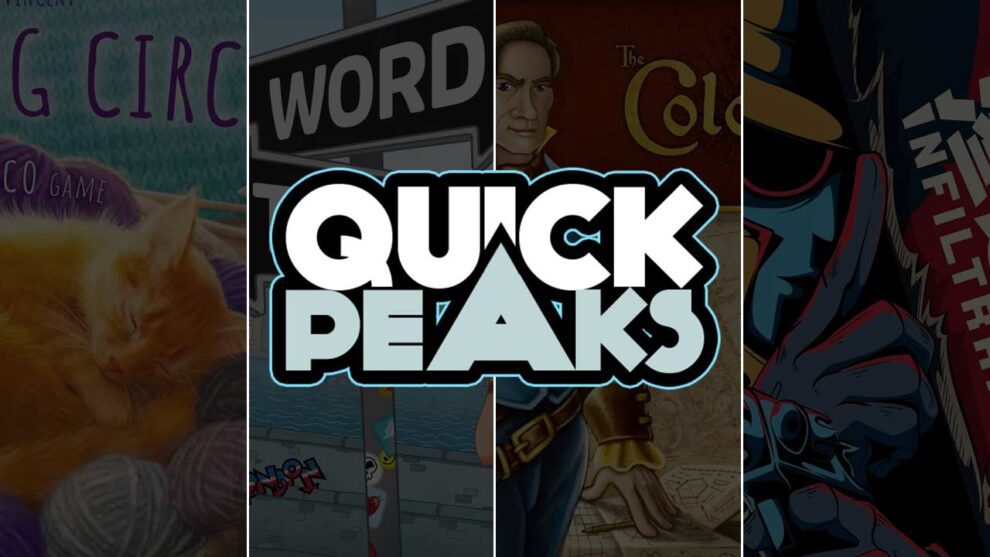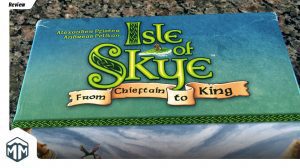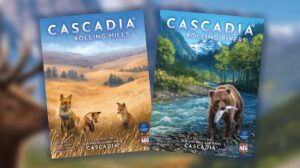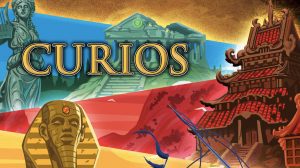Knitting Circle – Andy Matthews
I kicked off my recent River Valley Glassworks review with the word “cozy”, which is used to describe a “softer sort of book: fantasies, mysteries, etc. where the stakes are relatively low, and readers are given plenty of reasons to fall in love with the characters”. It just so happens that Knitting Circle, the upcoming release from Flatout Games falls deep into “cozy” territory. I mean…you’re knitting for goodness’ sake.
Knitting Circle is “a Calico game”, which means that it’s a sequel, but by a different designer. In this game players are collecting yarn in turn order from a central display, storing it on their player board, then simultaneously using that yarn to craft garments (hats, sweaters, mittens, socks, etc.) of varying lengths. Along with end game scoring on each garment, players can apply different patterns (symmetrical, color block, striped, etc) and color, and use cute little “grabby cat paw” tokens to help themselves out. And in true hipster fashion there’s even a nod to “ugly sweaters”-garments which don’t match a pattern…although this one costs you 3 points at the end of the game.
This new game fits solidly into the roster of titles from Flatout Games alongside Verdant, Calico, Cascadia, and others. It’s never a big challenge, but you always love the time you spend with the game. Knitting Circle hits Kickstarter in October, and if you’re like me you can’t wait to add it to your collection.
Ease of entry?:
★★★★☆ – The odd bump or two
Would I play it again?:
★★★★★ – Will definitely play it again
Read more articles from Andy Matthews.
Word Traveler – Justin Bell
As much as I have enjoyed word association games such as Codenames, Wavelength, and Just One, I strongly believe that it is worth trying anything that fits this category to ensure I haven’t missed anything. With that in mind, I tried out Word Traveler (2024, Office Dog/Asmodee) both at Gen Con 2024 then with a review copy sent by the publisher.
Word Traveler asks players to cooperatively score a set number of points, based on player count, by providing word card clues to navigate other players along the path you’ve taken during a trip to one of four cities included as boards with about 50 spaces on a loosely-drawn map of major cities like London and Tokyo. When building clues, players have access to 10 double-sided word cards—all featuring a word, then “not” that same word. So, for example, Peaceful on one side, Not Peaceful on the back. Using guidepost arrows, players try to guess which spaces you have tried to stop on using the clue cards, which results in points for the entire team as they try to collect six souvenir tokens. Word Traveler uses the same high score-style rating system as Just One—based on the number of tokens collected, you’ll land somewhere between a one (“Lost in Translation”) and a six (“Word Traveler”).
Word Traveler isn’t bad, but its word clue cards really left something to be desired during both of my two-player games. I’m sure this is partially intentional—providing word cards that have more direct descriptor words like “blue”, “round” or “tall” might make the game too easy for teammates—but it led to a surprising number of tough turns where sometimes none of the words made sense to provide as clues to my teammate to guide them to a specific space. Mystic Paths did Word Traveler’s system better, despite the former game’s near-total lack of a sensible theme. The two-player count is just right, because at five players, Word Traveler might turn into a 45-minute exercise that would be less interesting.
Ease of entry?:
★★★★★ – No sweat
Would I play it again?:
★★☆☆☆ – Would play again but would rather play something else
Read more articles from Justin Bell
The Colonists – K. David Ladage
Imagine, if you will, a night of debauchery between Agricola, Puerto Rico, and Suburbia. Throw in an element or two from a half-dozen other medium-heavy Euro games, and what you might end up with is The Colonists. The game describes itself as ‘epic’ and it is not exaggerating. The game is played over four eras; each era has five years; each year has two turns per player; each turn involves three actions. And each action is a freaking brain-burner.
Most of what you are doing is limited to your own player board. Here is where you will build your buildings, assign your citizens jobs, store your raw materials, and so on. In the center is a common game board that is assembled as the game progresses. At the start of the game, there are a couple of marketplaces with a bunch of other spaces where you can go to perform actions – like construct buildings (which may result in more citizens), gather raw materials, and so on. The problem is that the relative positions of these various locations can be advantageous or problematic. You see, this is a quasi-worker placement game where you have one worker to start, and he can only perform actions in a marketplace, or in a space adjacent to the one they were last in. These workers move along this pseudo-random grid of locations with a movement of one. So if the space where you can gather clay is on one side of the board and the place where that clay can be fired into bricks is on the other… then you are going to have to find a way to construct a building to get you clay (and get the proper type of citizen to work that building), or find some other way to get what you need. Oh… and if you land on a space where another player is sitting, you need to pay them resources from your supplies (called ‘the fee’) which gets more expensive each era.
Each turn, as I said, is three actions. Each year is two turns. At the end of each year, your production buildings will give you more resources (which you need to figure out how to store), you need to feed and clothe the citizens of your colony, and more locations are added to various spaces on the communal board. After five years, a new era begins and various things can change. What I have explained here leaves out a thousand details: embassies, advancement cards, the constantly shifting first-player token, the additional resources that come with advancing eras, and so on.
This is a game I have experienced just enough to know that I really want to experience more.
Ease of entry?:
★★★☆☆ – There were a few questions
Would I play it again?:
★★★★☆ – Would like to play it again
Read more articles from K. David Ladage
Infiltraitors – Andrew Lynch
Infiltraitors, a cooperative deduction game from designers John and Liam Keen and publisher Pandasaurus, is a perfect example of a game that is too clever for its own good. In a deck of cards numbered 2-15 (most of the time, anyway) in five suits (most of the time, anyway), your job is to figure out which cards have been set aside as Traitors. Who are the moles among us, my friends? On your turn, you choose from a host of simple actions to try and deduce together the identities of the infiltrators at the table.
The problem? The quality of the clues you can give is a bit too subject to the luck of the draw, and boy I hope you like counting cards. You will spend a remarkable amount of time flipping through that discard pile, using what’s already been played to help figure out what’s still possible.
This is all well and good. It’s not a bad idea for a game. But I do think the result is something that never flows, something that’s never fun. It is, fleetingly, clever. It is fleetingly satisfying. But it’s never, “Man, that was great, let’s do that again.” I certainly don’t want to.
Ease of entry?:
★★★☆☆ – There were a few questions
Would I play it again?:
★★☆☆☆ – Would play again but would rather play something else
Read more articles from Andrew Lynch














Add Comment